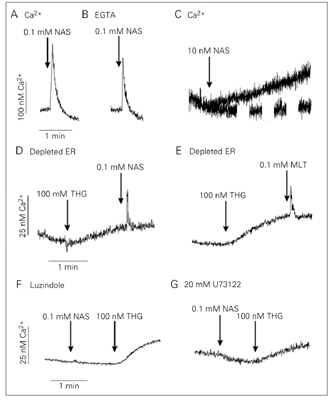The duration of the intraerythrocytic cycle of Plasmodium is a key factor in the pathogenicity of this parasite. The simultaneous attack of the host red blood cells by the parasites depends on the synchronicity of their development. Unraveling the signals at the basis of this synchronicity represents a challenging biological question and may be very important to develop alternative strategies for therapeutic approaches. Recently, we reported that the synchrony of Plasmodium is modulated by melatonin, a host hormone that is synthesized only during the dark phases. Here we report that N-acetyl-serotonin, a melatonin precursor, also releases Ca2+ from isolated P. chabaudi parasites at micro- and nanomolar concentrations and that the release is blocked by 250 mM luzindole, an antagonist of melatonin receptors, and 20 mM U73122, a phospholipase C inhibitor. On the basis of confocal microscopy, we also report the ability of 0.1 µM melatonin and 0.1 µM N-acetyl-serotonin to cross the red blood cell membrane and to mobilize intracellular calcium in parasites previously loaded with the fluorescent calcium indicator Fluo-3 AM. The present data represent a step forward into the understanding of the signal transduction process in the host-parasite relationship by supporting the idea that the host hormone melatonin and N-acetyl-serotonin generate IP3 and therefore mobilize intracellular Ca2+ in Plasmodium inside red blood cells.
Malaria; Plasmodium; Calcium; Melatonin; Circadian rhythm; Host-parasite interaction


